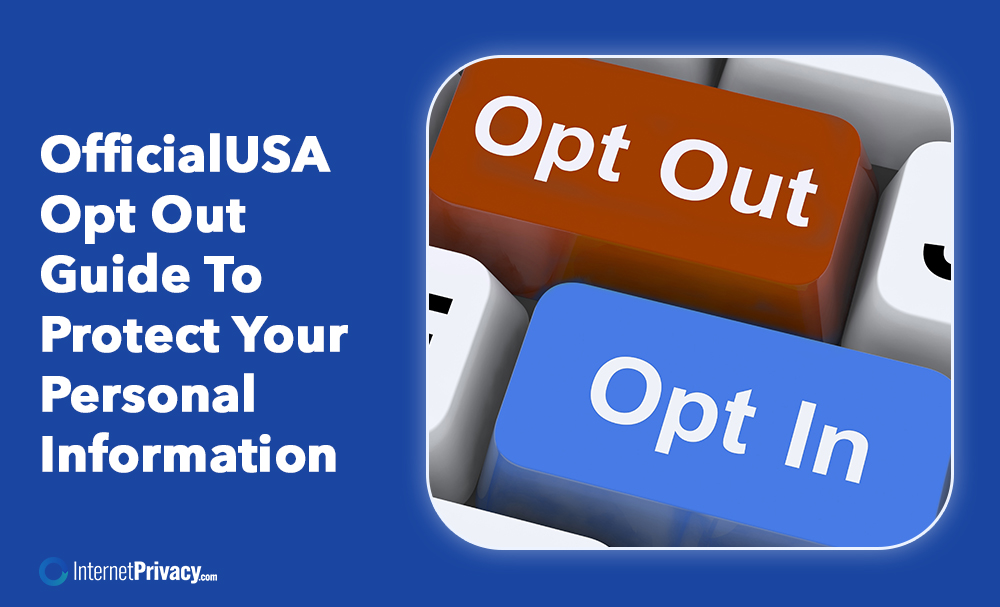How to Get Companies to Stop Selling Your Data

Is there a way to get companies to stop selling your data? Our guide below provides all the answers you’ll need to begin protecting your personal privacy online.
Getting data brokers to stop selling personal data can be hard. Since a data broker profits off of its data collection, you’ll need to request your personal details be scrubbed off the site manually.
Data brokers collect public records and sell your personal information to other companies for various reasons. If you want to learn how to stop data brokers from selling your data, read further to find out how.
Unless you do something with major data brokers, your personal info will exist in their data collection. Find out how to remove your info from data broker sites.
Let’s dive right in!
How to Stop a Data Broker from Collecting Your Info
In today’s digital age, personal data is a valuable commodity. Companies are continually collecting and selling consumer data to third parties, and while this may be lucrative, it can also be a huge invasion of privacy.
If you’re looking for ways to get companies to stop selling your info, here are ten tips you can use:
1. Check Your Data Privacy Settings
Most companies have data privacy settings that you can adjust. Make sure to check your settings and opt out of any data sharing that you don’t agree with.
2. Contact the Company
It never hurts to contact the company directly and ask them to stop selling your info. Explain why you don’t agree with their practices and ask for a commitment to stop.
3. File a Complaint
If the company is not responsive to your requests, you can file a complaint with the Federal Trade Commission. This can be done online or by phone to avoid a data breach. If you have already called data brokers and explained your data privacy rights and how you don’t want them to collect data on you, but they don’t respond, you can go directly to the FTC.
4. Use a Third-Party Data Protection Service
There are a number of third-party services that you can use to protect your data. These services will help keep your data private and secure, and they can also help you opt out of data sharing with companies.
5. Limit the Information You Share
If you want to minimize the data companies have on you, limit what you share online. Be aware of how much information you’re giving away, and don’t provide more than necessary.
Data broker lists often extract data from search engines, online activity, recent purchases, marriage licenses, court records, location data, and sometimes even info from your birth certificates and other info.
6. Shop With Companies That Respect Your Privacy
When possible, shop with companies that have a solid track record of respecting consumer privacy. Look for companies that have clear policies about data sharing and do not sell your data to third parties.
7. Use a Virtual Private Network
A Virtual Private Network (VPN) can help protect your data from being tracked and shared by data broker companies. When you use a VPN, your IP address and data are encrypted, and your traffic is routed through a secure server.
8. Read the Fine Print
Before signing up for a service, make sure to read the fine print. Look for any clauses that grant the company permission to collect and/or sell your data and opt out if necessary.
9. Make Use of Do Not Track Settings
Most browsers now have a “Do Not Track” feature that can be enabled. This will tell websites not to track your browsing activity, which can help reduce the data companies have on you.
10. Opt Out of Advertising Networks
Many companies use advertising networks to track and target consumers. You can opt out of these networks to help minimize the amount of data that companies have on you.
By following these ten tips, you can help ensure that companies are not selling your data. Remember that the more proactive you is about protecting your data, the more likely it is that companies will respect your privacy.
Why Data Brokers Collect Your Info
Data brokers are companies that collect and sell personal information about individuals, usually generated from online activities. They are able to compile vast amounts of data from various sources, including online surveys, search engine queries, social media tracking, and purchase histories.
This data can be sold to other companies for marketing and advertising purposes.
Here are the reasons why data brokers collect your personal information:
To target advertising
Data brokers may use the information they collect to target specific audiences with relevant ads. They may also use the data to analyze customer behavior, so they can create more effective campaigns.
To generate insights
Companies use data from data brokers to gain valuable insights into customers’ buying habits and preferences. This helps them make informed decisions about their products and services.
To increase customer loyalty
Data brokers may also use the information they gather to create loyalty programs. This helps businesses retain customers and build long-term relationships with them.
To track the customer journey
Data brokers use the data to track customers through the various stages of their buying journey. This helps businesses understand how customers interact with their products and services, so they can optimize their marketing efforts.
To detect fraud
Data brokers have sophisticated algorithms to detect fraud and other suspicious activities. This helps businesses protect their customers and their businesses.
To identify market trends
Data brokers can use the data to identify trends in the market. This helps businesses understand what products and services are in demand so that they can adjust their strategies accordingly.
To build customer profiles
Data brokers can use the data they collect to build detailed profiles of customers. This helps businesses create personalized customer experiences, leading to increased customer satisfaction.
To assess risk
Data brokers can also use the data to assess risk. This helps businesses make informed decisions about potential investments or partnerships.
To improve customer service
Data brokers can use the data to improve customer service. This helps businesses better understand their customer’s needs and provide them with better support.
To stay competitive
Data brokers provide businesses with valuable insights that can help them stay competitive in the market. By understanding customer behavior, businesses can develop strategies that can help them stay ahead of the competition.
How Data Laws Protect You
Data laws are essential for protecting the privacy of individuals and businesses. In recent years, data privacy has become a major issue, with organizations collecting and selling personal information to the highest bidder.
To ensure that individuals’ data is properly protected, governments around the world have implemented data laws to regulate how organizations collect and use personal data.
Here are three ways data laws protect you:
Transparency
Data laws require organizations to be transparent about how they use their data. Companies must provide clear and concise information about what data they are collecting, how it will be used, and who will have access to it. This allows you to make an informed decision about whether to provide your personal data or not.
Access and Control
Data laws give you the right to access and control your personal data. Companies must provide you with a way to view the data they have collected about you and to delete or correct it if necessary. This gives you the power to take control of your information and protect it from misuse.
Security and Protection
Data laws require organizations to implement measures to ensure the security of their data. This includes measures such as encryption, secure storage, and access controls. These measures help to protect your data from unauthorized access and misuse.
Data laws are important for safeguarding your privacy and protecting your data from misuse. They provide transparency, access and control, and security measures to ensure your data is protected. By understanding these laws, you can better protect yourself from data misuse and take control of your personal data.
Top Ways Data Companies Collect Your Info
Data brokers have become a major player in the digital space, collecting vast amounts of personal information about individuals for the purposes of marketing, advertising, and analytics.
It’s important to understand the ways data brokers get your information and what you can do to protect yourself from their activities.
Online Tracking
Data brokers often track individuals’ online activities using “cookies” – small files stored on a user’s computer – as well as other tracking technologies. They use this data to create detailed profiles of users’ interests, activities, and locations. This information can then be used to target advertising, offers, and other content.
Social Media Mining
Data brokers get vast amounts of data from social media accounts, such as posts, likes, comments, and shared content. This information can be used to build detailed profiles of users and to target them with tailored content.
Public Records
Data brokers also collect and analyze public records, such as criminal records, property records, and marriage records. This information is often used to build detailed profiles of individuals and target them with offers and other content.
Contact InternetPrivacy Today
InternetPrivacy has years of experience upholding privacy policies and protecting clients from unwanted data companies selling your personal info, including your home address or phone numbers. Our data removal services feature competitive pricing and proven results. If you can’t get companies to stop selling your data and you’re concerned about your digital privacy, our team is ready to assist.
We employ proprietary techniques to scan the web and start the deep data removal process to ensure any data collected on you are eliminated from the internet. If you want to stop the data brokering of your information, contact InternetPrivacy today at 866-349-0130 for a free online analysis.





